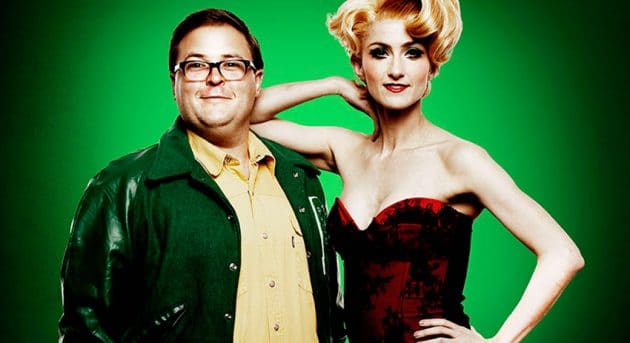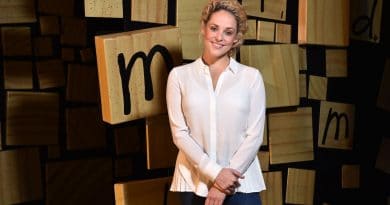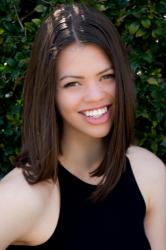Chatting with Little Shop’s leading lady Esther Hannaford
Tinderbox Productions and Luckiest Productions’ Little Shop of Horrors is currently touring the country after a highly acclaimed premiere at the Hayes Theatre in February. This cult classic musical with score by Howard Ashman and Alan Menken has received new life in director Dean Bryant’s vision. Leading lady Esther Hannaford has frequented the Australian stage as Penny in Hairspray, Ann Darrow in King Kong and is now starring as Audrey in Little Shop of Horrors. We caught up with Esther ahead of the Melbourne opening to talk about her childhood, making Audrey her own, the iconic number ‘Suddenly Seymour’ and why this cult classic keeps bringing audiences back – so much show that the show is coming back to Sydney, this time in the Roslyn Packer Theatre, in July.
When did you first know you wanted to be a performer?
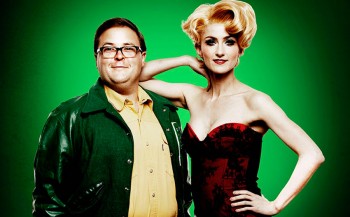
I don’t know if there was an exact moment to be honest. I know that I really enjoyed my dance classes when I was younger. I did a lot of professional performing when I was a child; we did a lot of corporate events and then I got my first musical when I was 12. So it’s almost like I skipped that point. It’s just something that I loved then I got to do it as a job.
You grew up as a dancer. What inspired the transition to musical theatre?
It was probably after high school when I did a foundation course at the national theatre when I went “you can do all 3!” I had always sung a little bit but I wasn’t trained or I didn’t feel as confident, I felt like I had to work on that area. Same as drama classes, I never had drama classes, it was sort of realising after high school that I really enjoyed it and enjoyed the story telling part of it and I wanted to focus on honing those skills.
Did you grow up listening to musicals?
I saw musicals; I didn’t necessarily listen to them. I had Les Mis on soundtrack. But I didn’t really grow up listening to musicals, although I did see a lot of them and we watched a lot of the movies.
Were you familiar with Little Shop of Horrors in your childhood?
That was one of the ones we watched! I don’t have many of those roles that I’d love to do but that was one of those roles that I connected with and thought I could bring a lot to. I enjoy that heightened dark, absurd style. I love when the comedy comes from a really dark, black place. The movie has a happy ending but I love that the musical doesn’t, that the myth lives out correctly, that everyone needs to pay for what they’ve done.
How did you approach making the iconic character of Audrey your own?
When they’ve got the character description in the script, they’ve got four women they kind of based Audrey on: Marilyn Monroe, Billie Holliday, Carol Channing and Goldie Hawn. If you take out their education, their self-worth, put them in a pair of high heels, and draw out the sweetest and most vulnerable parts of those ladies then you have your Audrey. They all have a natural vulnerability about them where they’re kind of exposed even when they’re being strong. So I looked a lot at these women and kind of formed my character out of that.
And of course going to the script and working on that and using my own imagination. But I felt like having those four women and then having the privilege of Ellen Greene to watch and seeing what she did with the character, that was enough to form my own version and not just take it off Ellen Greene because I thought that was important because what she has done is so iconic and incredible. She is Audrey. She really embodies everything we know about that character. So having those other women to look into and research was really helpful so I didn’t just get bogged down in that one portrayal.
‘Suddenly Seymour’ is such an incredible moment in the show for Audrey. What do you find challenging, and conversely, rewarding about that song?
I guess the challenge was making sure that the depth of that transition for her of accepting love from Seymour is shown. Because she’s never thought that she’s worth it. That was the challenge, that quick transition from exposing these truths about her life, about Orin and what she thinks she deserves, to Seymour going “hey, I’m here and you should come with me.” The challenge for me was just making sure that truth was there as well as staying true to the satire of the piece.
And rewarding… I guess it’s the moment in Audrey’s life, it’s this revelation, it’s a moment of epiphany and that’s very enjoyable to play out every night with Seymour. To see this guy she’s know for years and suddenly the whole situation is anew. That’s really enjoyable to get to do every night for her. It’s such a brief moment of happiness for her. There’s a lot of fun and a lot of comedy but her real life is quite dark and not very enjoyable, and most of her life she spends in fantasy to get out of that. She sees her life in pictures and movies, that’s how she stays happy and that’s how she pretends everything’s okay but this moment is an actual moment of happiness. It’s this brief moment of real joy and that’s great to explore.
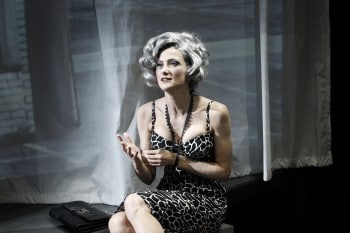
What’s your favourite moment in the show?
I enjoy ‘Suddenly Seymour’ and I enjoy the scene into that, which is sort of a rollercoaster, in that there are these truths they share with each other. I enjoy doing the whole thing – it sort of comes as one big package really. I enjoy Audrey’s arc from start to finish, that final contented moment she gets to just before she dies, it’s all leading from the beginning. For me it’s the challenge of piecing it all together. In musicals you only get those brief moments to try and make it coherent and believable and truthful to what I think is sort of happening in between those scenes.
In Sydney you were in the intimate Hayes Theatre which seats just over 100. You’ve just finished in Her Majesty’s Theatre in Adelaide with capacity of almost 1000. And you’re about to open in Melbourne’s Comedy Theatre with similar capacity. What differences have you found in playing to a much larger audience in a much larger space?
I guess it’s pretty similar. I’m aware of pictures, images, physical shapes and things like that and making sure that they’re really clear. I know in the Hayes you can be a little bit more filmic in the work that you do, but I know that in a big theatre you have to make sure that your gestures are really clear, so they’re the things I’ve been thinking about. But the intentions and the story and that kind of work, nothing really has changed.
What’s been a highlight of the Little Shop run so far?
Seeing Erth [creators of Audrey II] and Brent [Hill as Seymour] work on ‘Suppertime’ has been a real highlight for me. And watching Brent work out how to do the two voices, and all of us working with the puppet together to get it all to work, that’s been a real highlight. That always brings the cast together, like it did on King Kong, it’s almost like a team sport. There are so many highlights.
Getting to use a blood pack really excites me. Just silly things!
And the cast and crew, it’s kind of one of those magic shows where everyone gets along and everyone is very hard workers but it’s also very fun. So I think the cast and crew has been a real highlight.
What are you looking forward to about the rest of the tour?
I love seeing the different audiences’ reactions to comedy. That’s always so interesting to me. You go to one city and there’s one bit that works every single night and then you go to another city and it’s like nothing, but then this one moment that was nothing is now this massive moment. I just find it fascinating and I don’t understand it but I really enjoy that. It’s always different every city.
Little Shop has received such a great reception so far. What do you think it is about this musical and this production that makes it so incredible?
I think the tale is one that still resonates. That Faustian tale of what people will do to get what they want, how far will you go to get that thing you want, and I think people can still relate to that. And because it’s been put on stage in such a heightened, black, comedic way it’s nice to think about those things and see it in front of your eyes with the most sensationalised outcome.
This production… I think Dean [Bryant, director] has done a brilliant job of piecing together the work and it’s owed to the original, we’ve changed nothing, but having Brent do the voice has put this different psychological slant on it. I love that he hasn’t shied away from the darkness. It’s certainly not a light version of the show. It still has the comedy but I hope that people feel that darkness, particularly the beginning of the show and the bleak nature of the characters’ lives and their situations. And he’s put together a pretty great team; everyone just worked together really well. It feels like we’re all telling the same story, we all had that same dark image in mind.
Book your tickets for Little Shop of Horrors’ tour now before they sell out.

